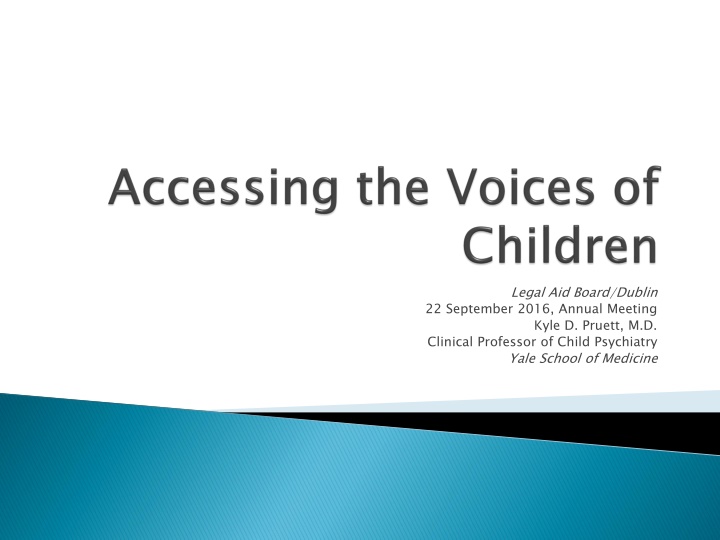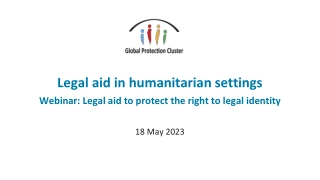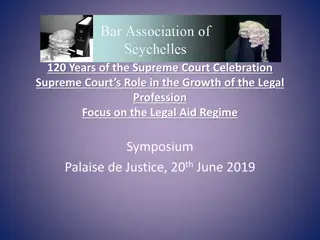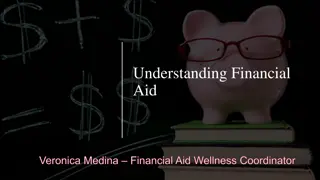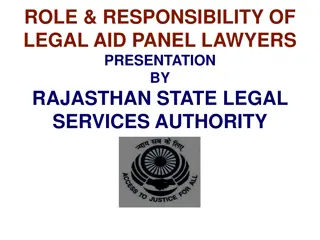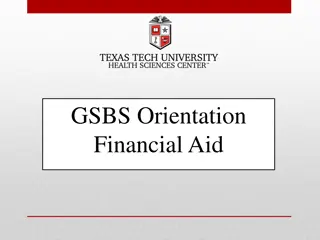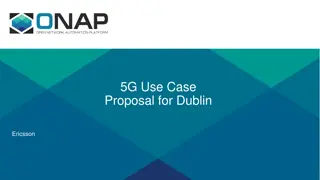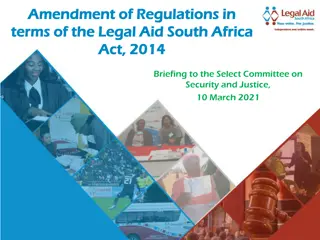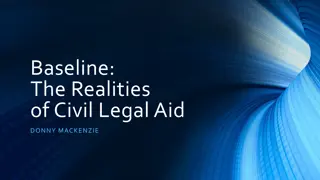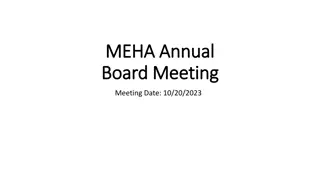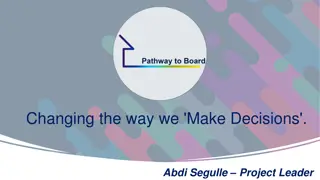Annual Meeting with Kyle D. Pruett, M.D. at Dublin Legal Aid Board
Discussing child psychiatry with Dr. Kyle D. Pruett from Yale School of Medicine at the annual meeting held in Dublin. The meeting encompasses valuable insights into the clinical aspects of child psychiatry, shedding light on the evolving landscape of mental health care for children. The discourse revolves around enhancing understanding and support for child mental well-being, addressing current challenges, and strategizing for a more comprehensive approach to pediatric mental health services.
Download Presentation

Please find below an Image/Link to download the presentation.
The content on the website is provided AS IS for your information and personal use only. It may not be sold, licensed, or shared on other websites without obtaining consent from the author.If you encounter any issues during the download, it is possible that the publisher has removed the file from their server.
You are allowed to download the files provided on this website for personal or commercial use, subject to the condition that they are used lawfully. All files are the property of their respective owners.
The content on the website is provided AS IS for your information and personal use only. It may not be sold, licensed, or shared on other websites without obtaining consent from the author.
E N D
Presentation Transcript
Legal Aid Board/Dublin 22 September 2016, Annual Meeting Kyle D. Pruett, M.D. Clinical Professor of Child Psychiatry Yale School of Medicine
Child input is directly relevant disputes & decisions Each child comes into focus Child input moves parents & helping professionals beyond best interest simplicity Can provide feedback to parents through the child s voice about what is important to child directly relevant to parental child comes into focus for parents/court Birnbaum & Ba tT, 2010; Birnbaum et al., 2011; Kelly, 2002, in press; Kelly & Kisthardt, 2009; Morag et al., 2012; Parkinson & Cashmore, 2008; Smith et al, 2003 Dr. Joan B. Kelley AAML 2013 2
Child feels acknowledged & heard without ceding control to parents or decisions-makers Interviewing children prior to decisions with life- long implications is respectful & fair Feedback to parents using child s voice often leads to dispute settlement When judicial decisions do not reflect children s wishes/views, they still appreciate being heard Birnbaum et al, 2011; Parkinson & Cashmore, 2008; Williams, 2006 Dr. Joan B. Kelley AAML 2013 3
Childs developmental stage and tasks Abnormal events in a normal life context Special needs Family Configuration Sources of influence & response Expectations & reactions of significant others, including extended family Stakes may high for child
May be advanced or delayed for their age Different abilities & coping styles Intelligence Avoidant vs. Engaging (mastery approach) Environmental Differences Intellectual stimulation Emotionally nurtured, abused, and/or neglected Psychological status: Depression, PTSD, Anxiety Disorders, ADHD 5
Even very young children can express their preferences on small matters other home, or what color to paint their new room. School age children can be asked (not given veto) power about which parties to attend, which sports they prefer in one town versus another. (voice ne veto) Adolescents usually desire to express their preferences on bigger matters, e.g. where to go to school and where to be on weekends. Even very young children can express their preferences on small matters other home, or what color to paint their new room. School age children can be asked (not given veto) power about which parties to attend, which sports they prefer in one town versus another. (voice ne veto) Adolescents usually desire to express their preferences on bigger matters, e.g. where to go to school and where to be on weekends. which toys to bring to which toys to bring to 6
Play very important: learn about reality, develop skills, and social behaviors Magical thinking compromises accurate perceptions: take responsibility Egocentricism/Physical causation: cannot understand unseen causes/ attribute to self Connections are immediate and automatic Seek experiences of Power vs. Feelings of helplessness (superhero interest)
Between ages 4 and 6 begin to understand another point of view Memory for central events More likely to incorporate false suggestions than older children and adults Cannot monitor their memory More likely to accept all adult reports as credible
Concrete Operations: logical thinking; cause and effect reasoning; time orientation Improved reality testing Can see other points of view, but initially only one at a time Memory is detailed and long-term Can size up social demands of a situation Desire to fit into peer group
Seek mastery and self-esteem Identity defined by sense of competence Moral development: accept rules and authority 9-12 more idealistic, moral judgments can produce rage, blame, alignment
Formal operations: think systematically about possibilities; abstract thought; anticipate consequences Consider complexity of moral issues beyond society s rules Able to hold multiple perspectives Development of identity separate from family Conformity to expectations and influences of peers = reference group Lie to get what they want
Older children may be asked to express not only what they would like, but also how it would work. 12
Match demands of interview to childs stage of development Age appropriate interview environments associated with more cooperation, motivation, attention, detail, and resistance to suggestion, less stress ( (Saywitz more cooperation, motivation, attention, detail, and resistance to suggestion, less stress Saywitz) ) 13
Child friendly: their best interest comes first Sit on the same level Limit # of words used in a sentence Avoid pronouns Use the child s language and terms Check the child s understanding of what you have said; ask the child to repeat
Child-appropriate communication skills Simple words, brief sentences Age-appropriate questions Check for understanding Review and summarize Empathic statements as appropriate communication 15
Sensitivity to/ability to recognize & deal with child s anxiety, discomfort, or anger Creating supportive environment by friendly behavior, warm intonation, flexibility Do not argue with child s perspective questions of clarification, not criticism
Cant be too goal oriented. Flexibility is key. The interview will be non- linear in nature. Build rapport . Let yourself play a little. Stay attuned to the child s feelings. Not necessarily intended to gather a child s preference. Not the source of determinative information Voice of Child Trainng Committee 2013*
Start with safe questions Engage without being invasive Set up physical space that works for the child Show you are taking the time to listen to child s words Allow time for child to talk First meeting may be short / more difficult topics in follow up meetings
Style: Friendly, non threatening Avoid any coercive messages (verbal or non- verbal) Age appropriate language Model narrative response Listen for child s reporting style, sense of time and chronology, level of articulated detail, level of engagement, overall cognitive level
Non-judgmental, curious, express empathy Neutral receptor; avoid asking 3 + questions in a row; use reflective statements Affirmations build rapport: If I were in your situation, I might be stressed out/confused too. I ve enjoyed talking with you and getting to know you. Thanks for meeting with me today. You have some good suggestions about how to lessen conflict.
The more you talk the less the child will Kids only answer the questions we ask Kids take things literally until about 10 Kids use big words before they understand them Kids have trouble putting events in chronological order Kids understand Who, What and Where First Kids understand When, Why, and How later
